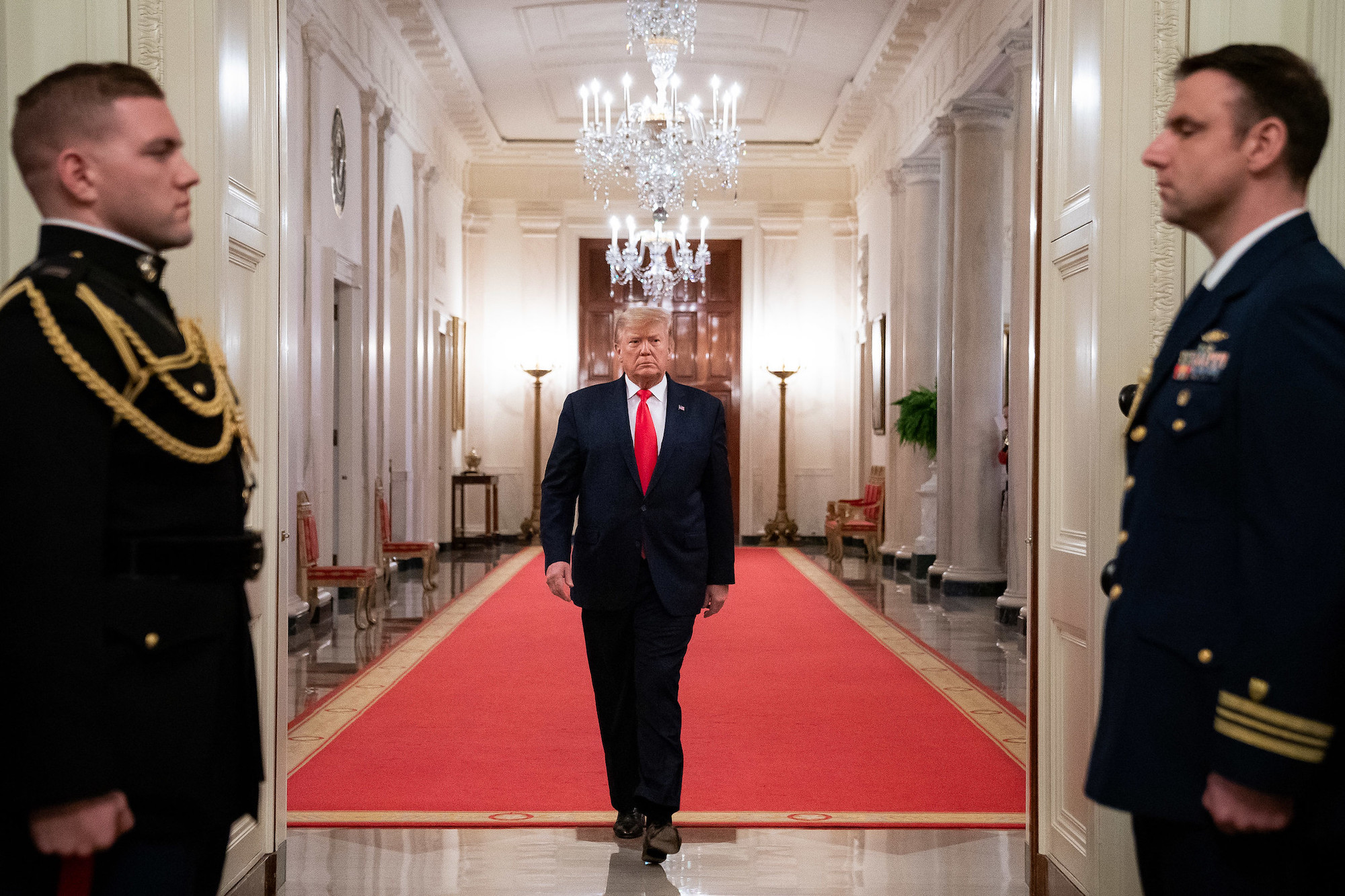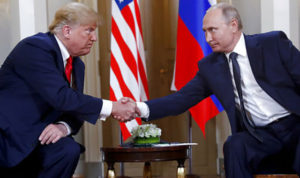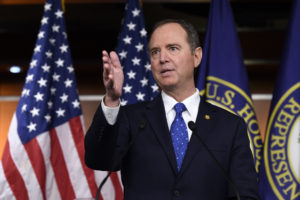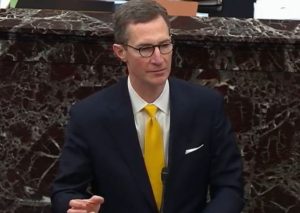The Impeachment of Trump Isn’t Nearly Enough
Impeachment is an important historical moment — but we must look past it to create the possibility of real change. President Donald J. Trump makes an entrance on Jan. 24 in the East Room of the White House. (Tia Dufour / Official White House Photo)
President Donald J. Trump makes an entrance on Jan. 24 in the East Room of the White House. (Tia Dufour / Official White House Photo)
 This article originally appeared on Salon.
This article originally appeared on Salon.
The impeachment of Donald Trump appears to be a crisis without a history, at least a history that illuminates, not just comparisons with other presidential impeachments, but a history that provides historical lessons regarding its relationship to a previous age of tyranny that ushered in horrors associated with a fascist politics in the 1930s. In the age of Trump, history is now used to divert and elude the most serious questions to be raised about the impeachment crisis. The legacy of earlier presidential impeachments, which include Andrew Johnson and Bill Clinton, provide a comparative historical context for analysis and criticism. And while Trump’s impeachment is often defined as a more serious constitutional crisis given his attempt to use the power of the presidency to advance his personal political agenda, it is a crisis that willfully ignores the conditions that gave rise to Trump’s presidency along with its recurring pattern of authoritarian behavior, policies, and practices. One result is that the impeachment process with its abundance of political theater and insipid media coverage treats Trump’s crimes as the endpoint of an abuse of power and an illegal act, rather than as a political action that is symptomatic of a long legacy of conditions that have led to the United States’ slide into the abyss of authoritarianism.
What is often ignored in the mainstream media is that Trump’s impeachment battle is part of the wider historical and global struggle taking place over democracy and can be seen, as Larry Diamond points out, in Trump’s attack on “the independence of the courts, the business community, the media, civil society, universities and sensitive state institutions like the civil service, the intelligence agencies and the police.” Trump’s crimes far exceed what is stated in the impeachment documents and include not only endless lies, threats and flirtation with extralegal violence but also his attack on the press as the “enemy of the people.” In addition, there is his use of Twitter to spew out verbal grenades that explode in an array of racial hatred and panics aimed at his critics and those groups who do not fit into his white nationalist view of citizenship and who should inhabit the public sphere. As the bully-in chief, he weaponizes language into a tool of hatred and in doing so transforms politics into a spectacularized theater of bigotry, humiliations, and violence. Ralph Nader argues that Trump’s most distinguishing impeachable offenses reside in his “abuses of the public trust” which range from his “obsessive pathological lying and falsifications” (over 15,000 since January 21, 2017) to his “endless racism and bigotry in words and deeds,” his support for voter suppression, and his “incitement of violence on more than one occasion.”
According to Nader, not only has Trump shredded and violated the Constitution, undermined its critical separation of power, and “illegally ordered his staff or ex-staff to ignore Congressional subpoenas to testify and provide documents, he has also ignored Congress’ right to declare war by inciting an unlawful crisis with Iran. There is a lesson to be learned here regarding how history is reproduced in the present. Trump’s killing of a high-ranking Iranian general “based on thin evidence with an eye towards domestic politics” mimics, if not recalls, an older period in history when Hitler, following the crisis produced by the Reichstag fire, seized upon the ensuing fear, terror, and war fever to further consolidate his power. For Trump, pushing the United States to the edge of war through a military strike not only draws attention away from the impeachment process and his ongoing crimes and misdeeds, but suggests, as Elizabeth Warren points out, that he will do “whatever he can to advance the interests of Donald Trump.” Trump’s haphazard decision to threaten a war with Iran also puts Americans at risk of terrorist attacks and undermines previous efforts to roll back Iran’s nuclear program. Moreover, Trump’s war fever is also a self-serving fascistic affirmation of his toxic hyper-masculinity and his admiration for military power and authoritarian displays generally associated with demagogues who use such displays as a tool to produce respect among their followers.
The politics of invisibility and the language of violence
Undoubtedly there have been serious political debates regarding the impeachment of Trump, but they have not gone far enough. The debates have focused mostly on issues such as the inadequacy of the Democrats’ efforts to impeach, arguments regarding whether the impeachment charges go far enough, and the more favorable view that the impeachment process, however limited, is necessary to stop Trump from using the resources of the government to influence other governments to interfere in American elections for his own personal and political gains.
There are also more extreme views largely coming from Trump and his supporters. Some have argued that the impeachment process is pure theater — a staged theatrical hoax; Others such as Sens. Lindsey Graham and Mitch McConnell have claimed that the process is rigged, and is an attempt on the part of the Democrats to win favor in the 2020 elections. Trump himself has angrily dismissed the impeachment process as corrupt, and claimed, among other things, that he is the victim of a socialist plot. It gets worse as Trump continues to produce a well-worn pattern of threats against his critics. He and his allies frequently respond to congressional Democrats involved in the hearing by weaponizing language, turning it into a vehicle of threats and intimidation. For instance, he has stated that House Intelligence Chairman Adam Schiff “should be arrested for treason.” In addition, Trump suggested that Schiff should “be violently punished” in a manner of justice displayed by dictatorships such as Guatemala. Jean Spanbauer, a Trump supporter, mused on line that “Shifty Shiff (sp) needs to be hung.” There is more at work here than the indiscriminate insult or infantile mocking. Language in this instance operates in the interest of violence, functioning so as to divert and punish. According to Victor Klemperer, an expert on Nazi Germany, this type of language has a precedent in the Third Reich in which it operated “as part of a linguistic malignant disease designed to spread the poison of mass seduction [and] destroy the intellect which defies it.”As Ishaan Tharoor observes, “the use of such volatile and dehumanizing language in the current moment is not innocent and often leads to violence. He writes:
There are immediate consequences to such demagoguery, not least in the form of far-right terrorist attacks and violence carried out by people inflamed by this sort of rhetoric. But there’s also a long-term toll, one that’s more imperceptible, yet no less corrosive, to the body politic. It’s the kind of erosion on display in places such as Hungary, Poland and Turkey, where majoritarian, nationalist politicians have steadily undermined democratic institutions and the liberal norms they’re supposed to uphold.
Political theater in the age of relentless lies
Within the current crop of competing discourses analyzing the impeachment, the Democrats present themselves as the “last line of defense between constitutional democracy and tyranny” while Republicans repeat conspiracy theories and accuse the Democrats of producing a show trial whose purpose is the ultimate reversal of Trump’s 2016 election to the presidency. The Republicans have been particularly egregious and have used the hearings to badger witnesses, and showcase their “emotive hand-wringing, faux exasperation and yelling,” all the while making outlandish claims that turn the hearings into a “propaganda circus.” In some cases, more insightful commentary has been produced, such as comments from legendary journalist Bill Moyers, who views the impeachment hearings as a potential site for a lesson in civic education. For Moyers, the value of the impeachment proceedings lie in that making visible “things you would never know otherwise.” Bringing the concept of civic education to understanding the impeachment process is crucial, but what people learn from such events is limited by what is actually revealed both within and outside of the hearings. In this case, Trump’s impeachment process in the House was reduced to a political spectacle and served to undermine reason and informed judgment while promoting a steady stream of the performative diversions produced through a regimen of ignorance, self-serving lies and the triumph of illusion.
Unfortunately, the mainstream 24/7 news cycle, with its relentless torrid of dramatic sound bites, did its best to turn the House impeachment hearings into political theater by largely focusing on the political risks Democrats faced by conducting the hearings. In addition, they mostly adhered to the empty tactic of providing balance while avoiding any attempt to tell the truth about a present that has collapsed into a disdain for human rights, enacts cruelty as an act of patriotism, justifies oppression in the name of national security, views undocumented immigrants as disposable, allows elections to be bought by the highest bidder, demonizes and threatens critics and regards the truth as a liability.
Beyond the two-party system
What is missing from mainstream and conservative discussions regarding Trump’s impeachment is that both Democrats and Republicans share an unwillingness to address a range of social and political issues that brought Trump to power. These include illegal wars, state sanctioned torture, the creation of black sites, economic policies that promote massive inequality and mass incarceration, an attack on public goods, and racist policies that undermine the very democracy. Both parties in different ways claim they are protecting the Constitution, whether in the service of defending Trump or attempting to remove him from office. As Andrew Bacevich argues, it must be remembered that it was the “Democratic members of the Senate and House [who] over the past decade and more [gave] presidents a free hand to wage war however they saw fit [and]cannot be described as anything but cowardly. It was after all, President Obama who pioneered the role of assassin-in-chief to which Trump has now laid claim.” Both parties have aided and abetted in different degrees elements associated with a totalitarian state — these include political corruption, unwarranted state surveillance, support for a bloated military machine, the rise of white nationalism, the concentration of wealth and power in the hands of a ruling elite, increased support for policies that promote the concentration of the media in few hands and a willingness to corroborate with a government that is controlled by narrow financial interests. All of these issues are largely absent from the questions and issues raised around the impeachment process and the conditions that made it necessary. Democracy may be in crisis, but there is little or no indication from the media, ruling elite or established politicians that the impeachment crisis is more than a free-standing event and should be analyzed within a more comprehensive politics that flushes out the mobilizing passions of a fascist politics that has led to the Trump presidency and its reign of corruption, lawlessness and abuse of power.
What must be rejected is the notion that the impeachment process signals a crisis rooted in a power struggle between the two established political parties, one of whom is at the forefront of the resistance to the growing authoritarianism accelerated by the Trump regime. While there are significant political and ideological differences between both parties, especially given the fact that the Republican Party has been taken over by ideological extremists, these differences neither criticize nor condemn the ideological and economic foundations of a toxic neoliberal capitalism that has become increasingly more dangerous at home and abroad. For instance, both parties share in defending existing power structures and the most basic rudiments of the corporate and surveillance state.
Vichy Republicans without apology
While the Republican and Democratic Party share a fundamental commitment to the ideology and institutional structures of neoliberal capitalism, the Republican Party is far more extreme in its critique of the American press, judiciary, dissent and labor unions, and its support for reversing environmental protection laws. Moreover, as Paul Krugman has argued, the Republican Party under Trump has become “a party of sycophants” that turns a blind eye to Trump’s use of his office for personal gain; and who with their cult like following compare their leader to Jesus Christ.
Ken Burns, the acclaimed filmmaker, columnist George Will and Krugman, among others, have labeled Trump’s loyal party followers “Vichy Republicans,” referring to the war-era collaborationist Vichy government of France — run by cowardly French sympathizers and appeasers who gave their faithful loyalty to their Nazi occupiers. In similar fashion, Trump’s Republican Party has bought into the script of ultra-nationalism, turned a blind eye to Trump’s racism, unchecked fantasies of power and his sanctioning of state violence at home and abroad.
This is a party that has chosen to look away in the face of Trump’s lies, crimes and repeated acts of corruption. Not only have they refused to take an impartial look at the impeachment inquiry, they have pledged to support Trump at all costs and have done everything possible to muddle the public discourse by floating conspiracy theories, calling the proceedings a hoax, and attacking the character of witnesses. This is a party that has been more than willing to engage in a Faustian bargain with incipient authoritarianism.
If the Republican Party once stood for basic principles such as small government, family values, fiscal soundness and national security, that is no longer true. Instead its most paranoid and racist elements now control the party. The Republican Party’s move to the right intensified in the 1990s under the influence of Newt Gingrich and Karl Rove, and later with the rise of Sarah Palin and the defeat of the centrist Mitt Romney in 2012.
Today, the Republican Party almost unilaterally has become a party of white supremacists, blood-and-soil nationalists and political corruption who activate white panic, voter suppression, and define citizenship in racial terms. Moreover, they support through either fear or blind loyalty Trump’s ideological policies, race baiting and dangerous foreign policy strategies, regardless of the excesses and ongoing assault on the country’s democratic institutions. This includes race baiting, a racist campaign strategy, caging children, savage attacks on undocumented immigrants, devaluing critics by calling them treasonous, slashing of social provisions such as food stamps, serial lying, and a reckless assassination made on impulse that brought the U.S. and Iran to the brink of war.
Theodor W. Adorno argued in “The Meaning of Working Through the Past” that “the past that one would like to evade is still very much alive.” This is particularly evident in the debilitating pronouncements of William Barr, Trump’s attorney general, regarding his defense of unchecked executive authority, which he believes should be unburdened by any sense of political and moral accountability. Tamsin Shaw is right in suggesting that Barr bears a close resemblance to Carl Schmitt, “the notorious … ‘crown jurist’ of the Third Reich.” Barr places the president above the law, defined as a kind of unitary sovereign. In addition, he appears to relish in his role as a craven defender of Trump, all the while justifying a notion of blind executive authority in the face of Trump’s endless lies, racist policies and lawlessness that echo the dark era of the 1920s and ’30s.
Barr’s attacks on the FBI and the Justice Department’s inspector general, and his threat to remove police protection from black communities who are not loyal to Trump, are at odds with any viable notion of defending the truth and “the most basic tenets of equality and justice.” Moreover, Barr provides legal and ideological cover for Trump’s dangerous lackeys, such as Senate Majority Leader Mitch McConnell and Sen. Lindsey Graham. McConnell publicly denounces the impeachment process and as an unabashed defender of Trump states that he will work hand in hand with the Trump administration on the impeachment process. In addition, Graham has stated that he has already made up his mind about Trump committing a criminal conspiracy, which he dismisses, and will do everything he can to make impeachment “die quickly” in the Senate.
Acquiescence to Trump has become a defining feature of the Republican Party in spite of his celebration of demagogues such as Kim Jong-un, whom he called a “real leader” and overtly fascist leaders such as Jair Bolsonaro in Brazil and Rodrigo Duterte of the Philippines. Paul Krugman goes so far as to claim that modern conservatives live inside a cult and are “turning into government by the worst and dumbest.” At the same time, he makes it clear that there is more than a massive degree of stupidity at work in the Trump administration, there are also the dark clouds of authoritarianism which extend far beyond the political career of Donald Trump. Krugman writes: “For whatever may happen to Donald Trump, his party has turned its back on democracy. And that should terrify you. The fact is that the G.O.P., as currently constituted, is willing to do whatever it takes to seize and hold power.” The impeachment hearings further reinforce an image of a party that in the face of egregious crimes by the president either remain mute or overtly support him in a show of ideological certainty or what Robert Jay Lifton calls an act of “absolute purification” and a cult-like totalizing vision that reproduces a politics of “malignant normality.”
Goldman Sachs Democrats
Neither political party offers a substantive challenge to the military-industrial complex, or views capitalism as the enemy of democracy if not the planet itself. In different ways, both parties have hollowed out democratic institutions and cozied up to dictators. In addition, neither party historically used the impeachment process to indict George W. Bush for launching an illegal war in Iraq, or for that matter George H.W. Bush for illegally kidnapping, jailing, and torturing what he indiscriminately labeled as “enemy combatants.” Nor was Obama charged with a war crime when he “gave the executive branch of the government the right to act as judge, jury and executioner in assassinating U.S. citizens, starting with the radical cleric Anwar al-Awlaki, and, two weeks later, his 16-year-old son?” There is more at work here than acts of bad faith, there is also a thread of moral hypocrisy and a flight from social responsibility on the part of both parties.
One indication of a collusion between both parties is obvious in the fact that as the Democrats were railing against Trump’s abuse of power, they approved the reauthorization of the USA Patriot Act and the National Defense Authorization Act, which are deeply reactionary laws that attack individual privacy and civil liberties, while criminalizing protest in the interest of national security. Moreover, they have given Trump $1.4 billion for his wall, and supported a $738 billion bloated military budget.
In the current moment, with a possible war with Iran still in the making, the ongoing anti-democratic actions of a deeply authoritarian Trump government, and the refusal of both political parties and the established press to address the deeper economic and political crisis facing the United States, it is crucial to analyze the current crisis of governance in a broader context that analyzes fascism as a possible wave of the future. The contemporary elements of tyranny at work in the United States point to not only a crisis of leadership and the rise of demagogues such as Trump on the domestic and global stages, but also the conditions and crisis that produce “the discontent of millions of people, facing economic instability, climate insecurity, mass migrations, technological change, cultural shifts around gender and race—people who in turn seem all too willing to embrace the politics of fear and blame.”
The age of crisis and apocalyptic prophecies
We live in an age of relentless crisis — an age marked by the collapse of civic culture, ethical values and democratic institutions that serve the public good. Language now operates in the service of violence and ignorance has become a national ideal. Religious fundamentalism, white supremacy, and economic tyranny now inform each other giving rise to an updated recurrence of fascist politics. This is an age in which apocalyptic prophecies replace thoughtfulness and sustained acts of social responsibility. In this age of crisis, right-wing populist regimes fuel conspiracy theories, normalize lying as a way to degrade public discourse, elevate emotion over reason as a way to legitimate a culture of cruelty, and society experiences its own pleasure through the need for vengeance and the imposition of brutality and injury upon those minorities considered disposable.
The impeachment process speaks not only to Trump’s ongoing criminal behavior and pernicious policies, it also points to a mass crisis of civic literacy and the inability of the public to understand how society has broken apart, become more cruel and receded from the language of critique, hope and the social imagination. A culture of withdrawal, privatization and immediacy reinforces an indifference to public life, the suffering of others and what Hannah Arendt once called “the ruin of our categories of thought and standards of judgment.”
The space of traditional politics and a media driven culture are marked by an ongoing culture of diversion and disappearance and no longer provide the language for understanding the totality of the crisis that has produced both Trump and the impeachment process. In the absence of a comprehensive politics capable of defining the related parts and threads that point to a society in crisis, violence, especially as related to the joining of a predatory neoliberalism and a fascist politics of white supremacy, becomes the regulative principle of everyday life.
Evidence of the distinctive nature of today’s crisis on both a national and global level can be glimpsed in the political and cultural forces that shaped President Trump’s impeachment, the Brexit fiasco, and the rise of authoritarian demagogues in Brazil, Turkey and Hungary, among other countries. This is a general crisis whose roots lie in the rise of global neoliberalism with its embrace of finance capital, massive inequities in wealth and power, the rise of the racial punishing state, systemic state violence and the creation of an age of precarity and uncertainty. This is a crisis produced, in part, through a full-scale attack on the welfare state, labor and public goods. Under such circumstances, democracy has become thinner and the social sphere and social contract no longer occupy an important place in Trump’s America.
As Nancy Fraser points out, “these forces have been grinding away at our social order for quite some time” and constitute not only a crisis of politics and economics, which is highly visible, but also a crisis of ideas which is not so visible. Put differently, the crisis of politics has not been matched by a crisis of ideas. Instead, as the global economy has unraveled, the backlash against the so-called political elites and established forms of liberal governance has produced movements for popular sovereignty that lack the crucial call for equal rights and social justice. The current historical crisis not only refigures the social sphere as a site of commercialism and infantilism, but also redefines matters of individual and social agency through the mediation of images in which self-alienation is reinforced within a culture of immediacy, disappearance and a flight from any sense of social responsibility.
Hard and soft “disimagination machines”
The crisis of politics is now matched by a mainstream and corporate controlled digital media and screen culture that produces political theater, heightens ignorance, fractured narratives and racial hysteria. At the same time, it authorizes and produces a culture of sensationalism designed to increase ratings and profits at the expense of truth, undermine a complex rendering of the related nature of social problems and suppress a culture of dissent and informed judgments.
We live in an age in which theater and the spectacle of performance empty politics of any moral substance and contribute to the revival of an updated version of fascist politics. Politics is now leaden with bombast, words strung together to shock, numb the mind, and images overwrought with self-serving sense of riotousness and anger. What is distinct about this historical period, especially under the Trump regime, is what Susan Sontag has called a form of aesthetic fascism with its contempt of “all that is reflective, critical, and pluralistic.”
One distinctive element of the current moment is the rise of hard and soft disimagination machines. The hard disimagination machines, such as Fox News, conservative talk radio and Breitbart News, function as overt and unapologetic propaganda machines that trade in nativism, misrepresentation and racist hysteria, all wrapped in the cloak of a regressive view of patriotism. As Joel Bleifuss points out, Fox News in particular, is “blatant in its contempt for the truth, and engages nightly in the “ritual of burying the truth in ‘memory holes’ and spinning a new version of reality [that keeps] the spirit of 1984… alive and well…. This, the most-watched cable news network, functions in its fealty to Trump like a real-world Ministry of Truth from George Orwell’s 1984, where bureaucrats “rectify” the historical record to conform to Big Brother’s decrees.”
Trump’s fascist politics and fantasies of racial purity could not succeed without the disimagination machines, pedagogical apparatuses and the practitioners needed to make his “vision not just real by grotesquely normal.” What Trump makes clear is that the weaponization of language into a discourse of racism and hate is deeply indebted to a politics of forgetting and is a crucial tool in the battle to undermine historical consciousness and memory itself.
The soft disimagination machines or liberal mainstream media such as “NBC Nightly News,” MSNBC and the established press function largely to cater to Trump’s Twitter universe, celebrity culture, and the cutthroat ethos of the market, all the while isolating social issues, individualizing social problems, and making the workings of power superficially visible. Politics as a spectacle saturates the senses with noise, cheap melodrama, lies and buffoonery. This is not to suggest that the spectacle that now shapes politics as pure theater is meant merely to entertain and distract. On the contrary, the current spectacle, most recently evident in the impeachment hearings in the Congress, function largely to separate the past from a politics that in its current form has turned deadly in its attack on the values and institutions crucial to a functioning democracy. In this instance, echoes of a fascist past remain hidden, invisible beneath the histrionic shouting and disinformation campaigns that rail against “fake news,” which is a euphemism for dissent, holding power accountable and an oppositional media. A flair for the overly dramatic eliminates the distinction between fact and fiction, lies and the truth.
Under such circumstances, the spectacle functions as part of a culture of distraction, division and fragmentation, all the while refusing to pose the question of how the United States shares elements of a fascist politics that connects it to a number of other authoritarian countries such as Brazil, Turkey, Hungary and Poland, which have embraced a form of fascist aesthetics and politics that combines a cruel culture of neoliberal austerity with the discourses of hate, nativism and racism. Political theater in its current form, especially with respect to the impeachment process, embraces elements of a fascist past and in doing so creates a form of self-sabotage in which the public largely refuses to “pose the question why Hitler and Nazi Germany continue to exert such a grip on modern life.”
Forgetting history and the legitimation of white supremacy
Another lesson to be learned from the absence of history, or what it means to even have a history in the discourse surrounding the impeachment hearings, is not only how ignorance gets normalized but also how the absence of critical thought allows us to forget that we are moral subjects capable of changing the world around us. The impeachment of Donald Trump is a crisis in need of being fully confronted both historically and in terms of a comprehensive politics that allows us to learn from alarming signs coming from the Trump administration. Such a crisis contains elements of a past that suggest we cannot look away or give in to the current assault on the past as a measure of intellectual respectability.
History offers a model to learn something from earlier turns towards authoritarianism making it more difficult to assume that fascism is merely a relic of the past. Memories of terror are not only present in the white supremacist parade of hate and bigotry that took place in Charlottesville in which violence was enacted in the name of “blood and soil” but also in the current white house which is home to white supremacists such as Stephen Miller, who is a high-level adviser to Trump and is viewed by many as the architect of his draconian immigration policies.
Recently, more than 900 of Miller’s emails were leaked by former Breitbart editor Katie McHugh. Among the trove of emails, Miller commented on and provided reference to white nationalist websites such as VDARE and celebrated the racist novel, “The Camp of the Saints.” He “also reportedly espoused conspiracy theories about immigration, backed racist immigration policies introduced by President Calvin Coolidge that were praised by Adolf Hitler, and deployed slang popular in white nationalist circles to reference immigration.” Judd Legum argues that Miller also “obsessed over the loss of Confederate symbols after Dylann Roof’s murderous rampage.”
In spite of a barrage of calls from a number of politicians calling for Miller’s removal from the White House, Trump held firm, reinforcing the widely accepted notion that Trump is a white nationalist entirely comfortable with white supremacist ideology. This is not surprising, since Trump brought the language of white nationalism into the White House and mainstream politics. Of course, removing Miller would not change much. Miller is not the main white supremacist in the Trump administration. Nor can his presence hide the fact that white supremacy has been a staple of the Republican Party for decades, evident in the history of and contemporary presence of high-profile Republican politicians such as Strom Thurmond, Jeff Sessions, Steve King, Tom Tancredo and Dana Rohrabacher.
Moreover, the long legacy of white supremacy in the United States should not undercut the distinctiveness of Donald Trump’s white supremacist views, which he wears like a badge of honor while escalating and normalizing white supremacist sensibilities, practices and policies unlike any president in modern times. His scapegoating of minorities and demonization of politicians, athletes and other critics of color reflects more than a divide-and-rule strategy, it is an updated strategy for mainstreaming the death-haunted elements of fascism.
In addition, Trump has consistently waged war on the “lying media” and elevated the spurious notion of fake news to the level of a common-sense assumption. The latter derogatory term has a strong resemblance to Hitler’s demonization of Lügenpresse — the lying press. Rick Noack states that “The defamatory word was most frequently used in Nazi Germany. Today, it is a common slogan among those branded as representing the “ugly Germany”: members of xenophobic, right-wing groups. This Nazi slur has also been used by some of Trump’s followers.”
Trump has legitimated a culture of lying, cruelty and a collapse of social responsibility. In doing so, he has furthered the process of making people superfluous and disposable all the while producing a fog of ignorance which gives contemporary credence to Hannah Arendt’s claim in “The Origins of Totalitarianism” that “The ideal subject of totalitarian rule is not the convinced Nazi or the convinced Communist, but people for whom the distinction between fact and fiction (i.e., the reality of experience) and the distinction between true and false (i.e., the standards of thought) no longer exists.”
Conclusion
The historian David Blight has written that Trump’s “greatest threat to our society and to our democracy is not necessarily his authoritarianism, but his essential ignorance — of history, of policy, of political process, of the Constitution.” Blight is only partly right, in that the greatest threat to our society is a collective ignorance that legitimates forms of organized forgetting, modes of social amnesia, and the death of civic literacy.
Under the Trump regime, historical amnesia is used as a weapon of (mis)education, politics, and power. The notion that the past is a burden that must be forgotten is a centerpiece of authoritarian regimes, one that allows public memory to wither and the threads of fascism to become normalized. While some critics eschew the comparison of Trump with the Nazi era, it is crucial to recognize the alarming signs in this administration that echo a fascist politics of the past. As Jonathan Freedland points out, “the signs are there, if only we can bear to look.” Rejecting the Trump-Nazi comparison makes it easier to believe that we have nothing to learn from history and to take comfort in the assumption that it cannot happen once again. No democracy can survive without an informed and educated citizenry.
The lessons of impeachment far exceed its stated limited aims as a form of civic education. It not only ignores the most serious of Trump’s crimes, it fails to examine a number of political threads that together constitute elements common to a global crisis in democracy. The impeachment process, when viewed as part of a broader crisis of democracy, cannot be analyzed and removed from the connecting ideological, economic and cultural threads that weave through often isolated issues such as white nationalism, the rise of a Republican Party dominated by right-wing extremists, the collapse of the two-party system, and the ascent of a corporate-controlled media as a disimagination machine and corrosive system of power.
Crucial to any politics of resistance is the necessity to analyze Trump’s use of politics as a spectacle and how to address it not in splendid isolation but as a form of diversion and political theater, but also as part of a more comprehensive political project in which updated forms of authoritarianism and contemporary versions of fascism are being mobilized and gaining traction both in the United States and across the globe. Federico Mayor, the former director general of UNESCO, once stated that “You cannot expect anything from uneducated citizens except unstable democracy.” In the current historical moment and age of Trump, it might be more appropriate to say that from a society in which ignorance is a virtue and civic literacy and education are viewed as a liability, you cannot expect anything but fascism.
Your support is crucial...As we navigate an uncertain 2025, with a new administration questioning press freedoms, the risks are clear: our ability to report freely is under threat.
Your tax-deductible donation enables us to dig deeper, delivering fearless investigative reporting and analysis that exposes the reality beneath the headlines — without compromise.
Now is the time to take action. Stand with our courageous journalists. Donate today to protect a free press, uphold democracy and uncover the stories that need to be told.






You need to be a supporter to comment.
There are currently no responses to this article.
Be the first to respond.